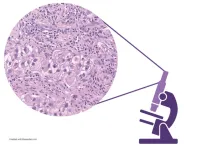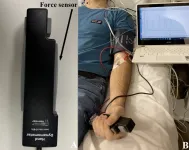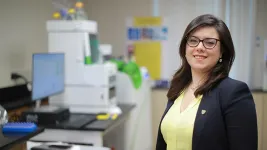(Press-News.org) The American Society for Biochemistry and Molecular Biology sent recommendations March 30 to the National Institute of Allergy and Infectious Diseases on expanding the institute’s diversity, equity, accessibility and inclusivity activities.
The society recommended, broadly, that the NIAID expand the use of diversity and re-entry grant supplements and better support disabled, LGBTQ+ and other underrepresented scientists.
“Because NIAID is one of the largest NIH institutes, they have an obligation to lead the way in making the scientific enterprise more equitable and accessible,” Sarina Neote, public affairs director of the ASBMB, said. “All underrepresented groups face challenges that we have brought to the federal government’s attention, but we hope our recommendations will drive changes allowing the disabled and LGBTQ+ populations to feel more at home in the sciences.”
According to the National Institutes of Health, diversity supplements aim to “increase diversity in the research workforce by providing training, mentorship and career development opportunities to individuals who are underrepresented in biomedical, behavioral, clinical, social and basic sciences research.” However, less than 1% of NIAID’s R01 grants are associated with diversity supplements, causing them to lag behind other NIH institutes.
Therefore, the ASBMB recommended that NIAID “conduct targeted outreach to underrepresented communities and investigators who serve in them to disseminate necessary information on diversity supplements, including how to apply for them, and eligibility criteria.” In addition, the ASBMB said NIAID needs to clarify eligibility requirements for diversity supplements, including granting eligibility to underrepresented Asian groups.
Reentry supplements aid scientists who attempt to reenter the workforce after a prolonged leave due to childrearing, caregiving, sexual harassment and other circumstances. The ASBMB recommended NIAID offer additional re-entry and re-integration supplements and expand their advertisement. “There are many pathways leading into scientific careers and out of them; all these experiences from individual scientists create a diverse, fruitful, innovative research ecosystem,” the society wrote. “Providing more opportunities for individuals to re-enter the scientific enterprise will benefit the innovative pipeline.”
Disabled individuals face enormous obstacles while trying to pursue a scientific education or career, Neote said. Because the majority of lab spaces are not accessible, the ASBMB urged “the NIAID to conduct outreach to institutions serving students with disabilities in STEM, offer infrastructure supplements to update labs to be ADA accessible and meet the principles of universal design, and ensure that all program announcements are reaching every scientist, regardless of their disability status.”
The ASBMB also called upon NIAID to expand funding for disability research as a recent NIH-funded report identified health and health care disparities affecting people with disabilities, which will help institutions meet the needs of this often-forgotten population.
In addition, the ASBMB urged the NIAID to provide more support for LGBTQ+ and underrepresented scientists, including establishing outreach programs. To aid in NIAID’s efforts to expand these resources, the ASBMB recommended creating an action plan similar to the National Institute on Drug Abuse Racial Equity Initiative, partnering with NIH’s UNITE program and establishing partnerships with minority-serving and predominately undergraduate institutions.
About the American Society for Biochemistry and Molecular Biology (ASBMB): The ASBMB is a nonprofit scientific and educational organization with more than 12,000 members worldwide. Founded in 1906 to advance the science of biochemistry and molecular biology, the society publishes three peer-reviewed journals, advocates for funding of basic research and education, supports science education at all levels, and promotes the diversity of individuals entering the scientific workforce. For more information about the ASBMB, visit www.asbmb.org.
END
ASBMB urges NIAID to prioritize DEAI
The society calls upon the institute to expand the use of research supplements, support scientists with disabilities and those in the LGBTQ+ community
2023-04-06
ELSE PRESS RELEASES FROM THIS DATE:
How to make better consistency and availability trade-offs in networks
2023-04-06
Imagine you want to withdraw some cash from an ATM. You expect it to show your account balance correctly and process your request quickly. However, network delays make it hard for the system to meet both of these simple expectations at the same time. If an ATM system tries to achieve high “consistency,” meaning that it displays the latest account balance by checking a remote database, it could make you wait or even prevent you from accessing your accounts during busy times. On the other hand, if an ATM system favors “availability,” it could let you access your accounts fast, but risk showing inaccurate information. To avoid undesired results, ...
Science journals integrate Dryad to simplify data deposition and strengthen scientific reproducibility
2023-04-06
The Science family journals have announced a partnership with the nonprofit data repository Dryad that simplifies the process by which authors deposit data underlying new work – a critical step to facilitating data’s routine reuse. The partnership is yet another step taken by the Science journals to ensure data the scientific community requires to verify, replicate and reanalyze new research is openly available.
“Addressing public access to data at scale is a critical challenge,” said Holden Thorp, Editor-in-Chief of the Science family ...
Men and women have different obesity drivers, pointing to the need for tailored interventions
2023-04-06
A new study from UCLA researchers finds sex-specific brain signals that appear to confirm that different drivers lead men and women to develop obesity. The study, appearing in the peer-reviewed journal Brain Communications, combined data from several modes of MRI with patients’ clinical features and personal histories to identify sex-specific mechanisms in the brain underlying obesity.
“We found differences in several of the brain’s networks associated with early life adversity, mental ...
Disparities identified among patients receiving advanced pulmonary support
2023-04-06
Some adults with severe respiratory illness, including women, those with public insurance, and people with fewer financial resources, may be less likely to receive an advanced form of life support known as extracorporeal membrane oxygenation (ECMO). A research team supported by the National Institutes of Health found that adults who received ECMO appeared to skew toward men, people with private health insurance, and those who came from areas with higher median incomes. ECMO helps patients with life-threatening illness or injury breathe by simulating the function of the heart and/or lungs, while giving those organs a chance to rest.
The study published in the Annals of the American ...
Researchers ID biomarkers of response to immunotherapy for kidney cancer
2023-04-06
The number of immune cells in and around kidney tumors, the amount of dead cancer tissue, and mutations to a tumor suppressor gene called PBRM1 form a biomarker signature that can predict — before treatment begins — how well patients with kidney cancer will respond to immunotherapy, according to new research directed by investigators at the Johns Hopkins Kimmel Cancer Center and its Bloomberg~Kimmel Institute for Cancer Immunotherapy.
In reviews of 136 kidney tumor biopsies taken for previous studies, investigators found that patients who had three positive factors — presence of immune cells in and around tumors, known as tumor-infiltrating immune cells, absence ...
Studying consciousness without affecting it
2023-04-06
Studies of consciousness often run into a common conundrum of science—it’s hard to measure a system without the measurement affecting the system. Researchers assessing consciousness, for instance as volunteers receive anesthesia, typically use spoken commands to see if subjects can still respond, but that sound might keep them awake longer or wake them up sooner than normal. A new study not only validates a way to assess consciousness without external stimulation, it also finds that it may be more precise.
“We want to measure when people make the transition from conscious to unconscious, and vice versa, but as soon as you ask someone to do something, which is the classic ...
New pesticide exposure test developed to protect inexperienced cannabis farmers
2023-04-06
A chemical analyst and expert in micro-extraction at The University of Toledo created a more reliable, robust and efficient way to monitor pesticide exposure and help protect the health and safety of agricultural workers, especially for emerging sectors like the cannabis industry.
Dr. Emanuela Gionfriddo, an assistant professor of analytical chemistry, and Nipunika H. Godage, a Ph.D. candidate in UToledo’s Dr. Nina McClelland Laboratory for Water Chemistry and Environmental Analysis, published research in the journal Analytical and Bioanalytical Chemistry outlining their groundbreaking method that is able to detect 79 pesticide residues in human blood plasma ...
Binghamton University receives $9.3 million in federal funding to train school-based mental health professionals
2023-04-06
BINGHAMTON, N.Y. -- Economically disadvantaged students face food scarcity, unreliable access to services and other stressors, which can have a huge impact on their mental health. In Broome and Tioga counties, more than 50% of children live in families characterized as low income. New federal funding will help to put more Binghamton University social work students in schools to provide the services that these students need to succeed.
The U.S. Department of Education has awarded two 5-year awards, totalling $9.3 million, to Binghamton University Community Schools (BUCS) to ...
Non-drug interventions for patients with Alzheimer’s are both effective and cost-effective, study shows
2023-04-06
PROVIDENCE, R.I. [Brown University] — While new drugs to treat Alzheimer’s disease tend to receive the most public attention, many well-researched ways to care for people with dementia don’t involve medication. A new evaluation compared the cost-effectiveness of four non-drug interventions to the usual care received by people with dementia and found that the interventions not only resulted in a better quality of life, but also saved money.
In a study published April 6 in Alzheimer's & Dementia: ...
Moving towards 3 degrees of warming – the phasing out of coal is too slow
2023-04-06
The use of coal power is not decreasing fast enough. The Paris Agreement’s target of a maximum of 2 degrees of warming appear to be missed, and the world is moving towards a temperature increase of 2.5–3 degrees. At the same time it is feasible to avoid higher warming. This is shown by researchers from Chalmers University of Technology and Lund University, Sweden, in a new study.
“More and more countries are promising that they will phase out coal from their energy systems, which is positive. But ...
LAST 30 PRESS RELEASES:
New ‘scimitar-crested’ Spinosaurus species discovered in the central Sahara
“Cyborg” pancreatic organoids can monitor the maturation of islet cells
Technique to extract concepts from AI models can help steer and monitor model outputs
Study clarifies the cancer genome in domestic cats
Crested Spinosaurus fossil was aquatic, but lived 1,000 kilometers from the Tethys Sea
MULTI-evolve: Rapid evolution of complex multi-mutant proteins
A new method to steer AI output uncovers vulnerabilities and potential improvements
Why some objects in space look like snowmen
Flickering glacial climate may have shaped early human evolution
First AHA/ACC acute pulmonary embolism guideline: prompt diagnosis and treatment are key
Could “cyborg” transplants replace pancreatic tissue damaged by diabetes?
Hearing a molecule’s solo performance
Justice after trauma? Race, red tape keep sexual assault victims from compensation
Columbia researchers awarded ARPA-H funding to speed diagnosis of lymphatic disorders
James R. Downing, MD, to step down as president and CEO of St. Jude Children’s Research Hospital in late 2026
A remote-controlled CAR-T for safer immunotherapy
UT College of Veterinary Medicine dean elected Fellow of the American Academy of Microbiology
AERA selects 34 exemplary scholars as 2026 Fellows
Similar kinases play distinct roles in the brain
New research takes first step toward advance warnings of space weather
Scientists unlock a massive new ‘color palette’ for biomedical research by synthesizing non-natural amino acids
Brain cells drive endurance gains after exercise
Same-day hospital discharge is safe in selected patients after TAVI
Why do people living at high altitudes have better glucose control? The answer was in plain sight
Red blood cells soak up sugar at high altitude, protecting against diabetes
A new electrolyte points to stronger, safer batteries
Environment: Atmospheric pollution directly linked to rocket re-entry
Targeted radiation therapy improves quality of life outcomes for patients with multiple brain metastases
Cardiovascular events in women with prior cervical high-grade squamous intraepithelial lesion
Transplantation and employment earnings in kidney transplant recipients
[Press-News.org] ASBMB urges NIAID to prioritize DEAIThe society calls upon the institute to expand the use of research supplements, support scientists with disabilities and those in the LGBTQ+ community




